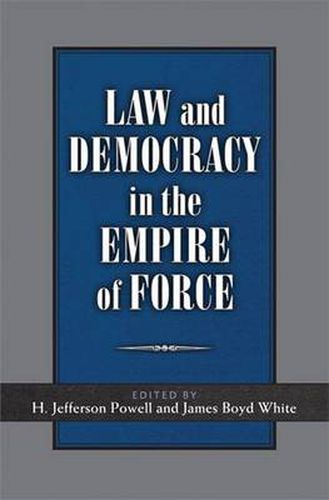Readings Newsletter
Become a Readings Member to make your shopping experience even easier.
Sign in or sign up for free!
You’re not far away from qualifying for FREE standard shipping within Australia
You’ve qualified for FREE standard shipping within Australia
The cart is loading…






Neither law nor democracy can survive where the empire of force dominates. The authors in this book agree that the relation between law and democracy in the U.S. has been deteriorating badly, and that such changes are visible in a wide array of legal and governmental phenomena, such as: legal teaching, judicial opinions, legal practice, international relations, legal scholarship, and congressional deliberations. In each of these legal/political/cultural intersections, traditional expectations and behaviors have been transformed or thwarted, and these changes pose a threat to law and democracy in our country and in our culture.The editors, and the individual authors, trace these specific examples of normative decline to ‘the empire of force’ (a term borrowed from Simone Weil who applies it not only to the brute force of the kind used by police and soldiers, but, more broadly, to the underlying ways of thinking and talking and imagining that make that sort of force possible, including propaganda, unexamined ideology, sentimental cliches, and politics by buzzwords).The editors and authors of these essays agree not only about the underlying crisis and its causes but also the proposition that neither law nor democracy can survive where the empire of force dominates. Nonetheless, each of the chapters manages to convey a basis for optimism despite its focus on a specific example of legal, political or cultural degeneration.
$9.00 standard shipping within Australia
FREE standard shipping within Australia for orders over $100.00
Express & International shipping calculated at checkout
Neither law nor democracy can survive where the empire of force dominates. The authors in this book agree that the relation between law and democracy in the U.S. has been deteriorating badly, and that such changes are visible in a wide array of legal and governmental phenomena, such as: legal teaching, judicial opinions, legal practice, international relations, legal scholarship, and congressional deliberations. In each of these legal/political/cultural intersections, traditional expectations and behaviors have been transformed or thwarted, and these changes pose a threat to law and democracy in our country and in our culture.The editors, and the individual authors, trace these specific examples of normative decline to ‘the empire of force’ (a term borrowed from Simone Weil who applies it not only to the brute force of the kind used by police and soldiers, but, more broadly, to the underlying ways of thinking and talking and imagining that make that sort of force possible, including propaganda, unexamined ideology, sentimental cliches, and politics by buzzwords).The editors and authors of these essays agree not only about the underlying crisis and its causes but also the proposition that neither law nor democracy can survive where the empire of force dominates. Nonetheless, each of the chapters manages to convey a basis for optimism despite its focus on a specific example of legal, political or cultural degeneration.